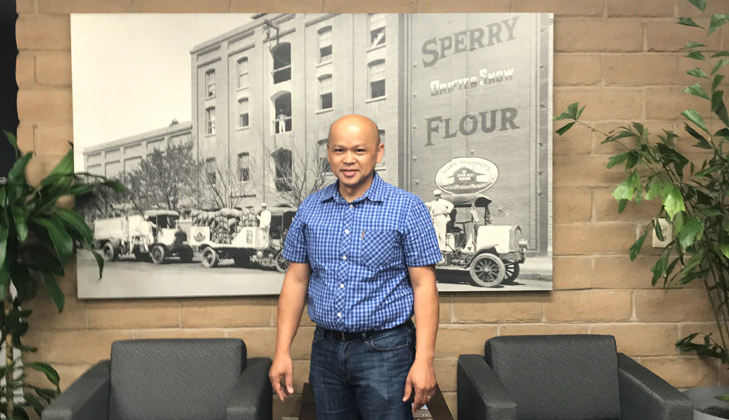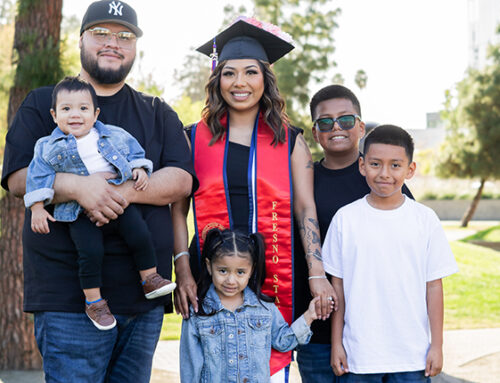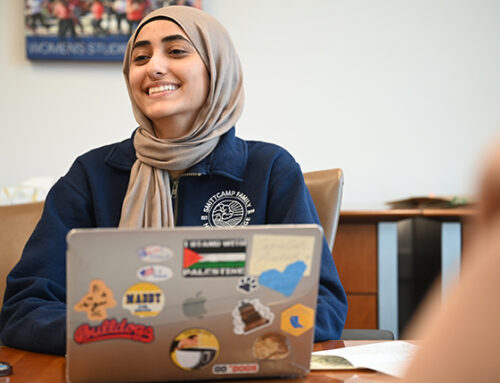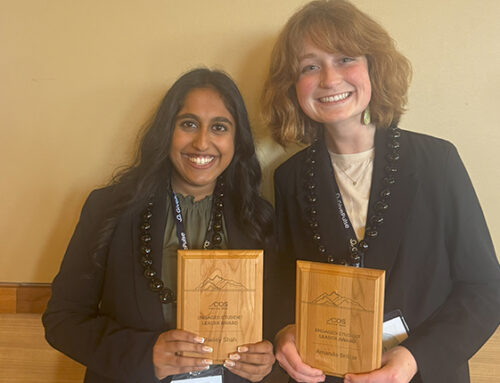Like many Fresno State faculty members, Neil Tung is adjusting to a new teaching environment the past month. Response to the COVID-19 pandemic has also significantly impacted his full-time job as a purchasing manager for commercial food supplier Rob Ross Foods.
The Agricultural Business Department lecturer spends part of each weekday this semester teaching management and computer application classes. The rest of his day involves buying and selling key baking ingredients like flour from Central California and as far away as Montana.
He also acquires shortenings and fillings for cakes and pastries, and related specialty products from Mexico and Indonesia. Customers range from doughnut shops and bakeries to school districts, grocery stores and smaller markets, including those from different cultures like Mexican panaderías.
In his 17 years working for the largest bakery supplier in Central California, he has never seen such a sudden rise and drop in orders. First, it was the demand for orders to meet the consumer shopping panic in mid-March, followed by a decline in sales by almost 40%.
“Some of our customers were not considered essential services and could not allow customers inside,” said Tung. “Other operations don’t have the technology to take orders over the phone or through apps and deliver products. Even some of the ones that could work with curbside pickup or call-in orders were still affected because they aren’t native English speakers and can have difficulty taking these specific orders.”
The changes in customer traffic and access affected his brother-in-law, Chantra Kong, who had to close his Rollen Donuts shop in Merced.
Fresno’s Indian community also temporarily exhausted the company’s supplies of stone ground wheat flour for home baking needs. Customers were still expected to buy a minimum of 100 dollars of flour to meet the business criteria, and supplies have since been replenished.
His company has not had to lay off any of its 35 employees yet, although work schedules have been shifted from five to four days a week for many in the delivery workforce. Part of that has been made possible by combining routes and orders to keep delivery trucks more full that are headed as far away as the Bay Area and Sacramento.
In his position, he is trying to keep inventory at manageable levels that are not too high or low, even while availability fluctuates and some products have shorter shelf lives.
Other responsibilities involve managing hourly employee payroll, invoices, billing and vendors that need food safety information such as third-party audits and kosher certification.
The company has changed some of its normal protocol to meet social distancing guidelines.
Local customers are not allowed to come inside the location. Orders are called in advance, and products are loaded outside in the driveway. Delivery employees use hand sanitizer and gloves, and try to maintain a safe distance.
“I imagine that our hand sanitizer stations are here to stay, even after things return to normal,” said Tung. “It’s a good practice to have, and people will be more conditioned to using them every day.”
He has added managing tractor and trailer safety duties since an older employee has voluntarily stayed at home because of his potential vulnerability to the COVID-19 virus.
Tung has also developed new skills while adapting to the remote instruction.
He has used different video platforms such as Zoom and the Canvas campus education online portal for most of his lessons. His son, who is home from college, has also helped him create and upload a video lesson to YouTube.
The importance of adaptability and families are key tenets to him.
Born in Cambodia in 1974, the youngest of nine children, his parents and older siblings were forced to grow rice and corn in labor camps while millions of other Cambodians were murdered by the regime of Pol Pot.
His family eventually immigrated to Thailand in 1979, and were accepted for resettlement in the United States in 1981. After arriving in San Francisco, they settled in Stockton where other family members already lived.
In high school he developed a passion for agriculture through FFA and grew chili peppers and learned about plant and animal science.
After he started college at Chico State in 1994, he worked on the campus farm with the crop and dairy units before graduating in 1999.
In 2003, he began his career with Rob Ross Foods based on his experience and ability to speak Khmer since the company was considering buying a Cambodian-owned distributor in Fresno. Although the potential acquisition was tabled his third day on the job, he has remained with the company ever since.
Tung received his MBA from Fresno State in 2009 while working for the company, which also was supportive of him joining the Fresno State faculty in 2014.
Despite all the adjustments the past month, he knows recent experiences can help give students a new angle on business practices.
“This will reshape all of us in new ways, including companies,” said Tung. “I imagine they’ll be watching expenses more closely, and determining new ways to use their employees more efficiently. This is a unique opportunity for students to learn how businesses deal with real-world issues and evolve to meet the needs of all customers.”





